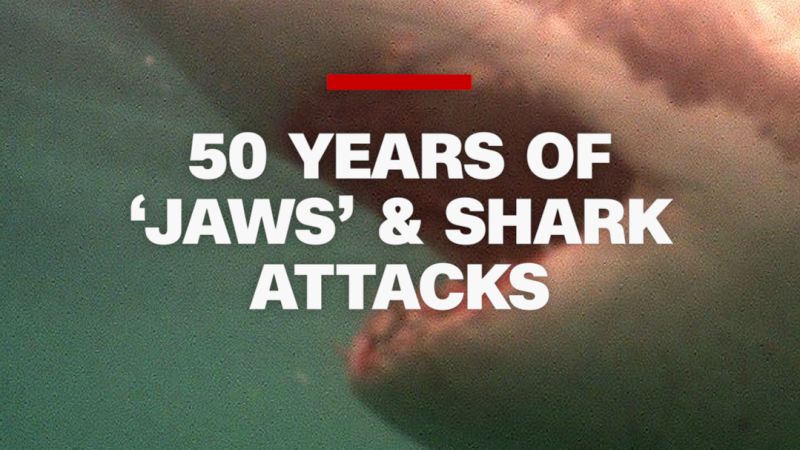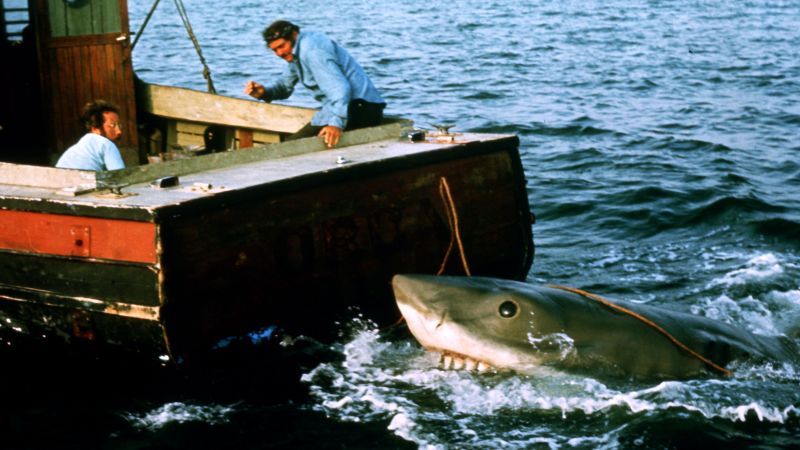Jaws At 50: Fact Vs. Fiction In The World Of Shark Attacks

Welcome to your ultimate source for breaking news, trending updates, and in-depth stories from around the world. Whether it's politics, technology, entertainment, sports, or lifestyle, we bring you real-time updates that keep you informed and ahead of the curve.
Our team works tirelessly to ensure you never miss a moment. From the latest developments in global events to the most talked-about topics on social media, our news platform is designed to deliver accurate and timely information, all in one place.
Stay in the know and join thousands of readers who trust us for reliable, up-to-date content. Explore our expertly curated articles and dive deeper into the stories that matter to you. Visit Best Website now and be part of the conversation. Don't miss out on the headlines that shape our world!
Table of Contents
Jaws at 50: Separating Fact from Fiction in the World of Shark Attacks
This summer marks the 50th anniversary of Steven Spielberg's cinematic masterpiece, Jaws. The film, while a work of art, cemented a terrifying, and largely inaccurate, image of sharks in the public consciousness. For decades, Jaws has fueled unfounded fears, impacting conservation efforts and shaping public perception of these magnificent creatures. But how much of the movie's portrayal of shark attacks reflects reality? Let's dive into the facts and debunk some persistent myths.
The Reality of Shark Attacks: A Statistical Perspective
While Jaws depicted a relentless, man-eating great white, the reality is far more nuanced. Globally, shark attacks are incredibly rare. According to the Florida Museum of Natural History's International Shark Attack File (ISAF), only a few dozen unprovoked attacks occur worldwide annually. This number is dwarfed by the number of human deaths caused by things like bee stings or lightning strikes.
Furthermore, the majority of shark attacks are not fatal. Many involve bites that are superficial, perhaps due to a case of mistaken identity. Sharks often rely on sight, smell, and electroreception to locate prey, and in murky water or poor visibility, a human limb might be mistaken for a seal or other usual food source.
Key takeaway: The chances of being attacked by a shark are astronomically low. Fear shouldn't outweigh the understanding of their crucial role in the marine ecosystem.
Debunking the Jaws Myths:
-
Myth 1: Great white sharks are relentlessly aggressive man-eaters. While great whites are apex predators, they rarely attack humans. Their diet primarily consists of seals, sea lions, and other marine mammals. Attacks on humans are usually a case of mistaken identity or investigatory bites.
-
Myth 2: Sharks are mindless killing machines. Sharks are intelligent animals with complex behaviors. They are not inherently malicious; their actions are driven by survival instincts. The portrayal of a vengeful, persistent shark in Jaws is a dramatic exaggeration.
-
Myth 3: All sharks are dangerous. The vast majority of shark species pose no threat to humans. Out of the hundreds of shark species, only a handful are responsible for the majority of attacks, and even then, incidents remain exceedingly rare.
The Impact of Jaws on Shark Conservation:
The lasting legacy of Jaws is unfortunately not just about cinematic thrills. The film contributed to a widespread fear of sharks, leading to increased culling and a decline in shark populations globally. Many shark species are now endangered due to overfishing and habitat loss, highlighting the importance of responsible fishing practices and conservation efforts. Organizations like the are actively working to protect sharks and their vital role in ocean health.
Moving Forward: Appreciation over Fear
Fifty years after its release, Jaws remains a cultural icon. However, it's crucial to remember that the film's depiction of sharks is a significant departure from scientific reality. Instead of perpetuating fear, let's use this anniversary as an opportunity to learn more about these fascinating creatures and advocate for their conservation. Understanding the true nature of shark attacks – rare events, usually a result of mistaken identity – allows us to appreciate these magnificent animals for their essential role in maintaining a healthy ocean ecosystem.
Call to Action: Learn more about shark conservation efforts and support organizations dedicated to protecting these vital marine predators. Let's replace fear with informed understanding and work together to ensure the survival of these magnificent creatures for generations to come.

Thank you for visiting our website, your trusted source for the latest updates and in-depth coverage on Jaws At 50: Fact Vs. Fiction In The World Of Shark Attacks. We're committed to keeping you informed with timely and accurate information to meet your curiosity and needs.
If you have any questions, suggestions, or feedback, we'd love to hear from you. Your insights are valuable to us and help us improve to serve you better. Feel free to reach out through our contact page.
Don't forget to bookmark our website and check back regularly for the latest headlines and trending topics. See you next time, and thank you for being part of our growing community!
Featured Posts
-
 How Recent Immigration Protests Affected Trumps Approval Rating
Jun 22, 2025
How Recent Immigration Protests Affected Trumps Approval Rating
Jun 22, 2025 -
 British Lgbt Awards Recognize Steps Ian Watkins Contributions
Jun 22, 2025
British Lgbt Awards Recognize Steps Ian Watkins Contributions
Jun 22, 2025 -
 The Meaning Behind Machine Gun Kellys Daughters Name Saga
Jun 22, 2025
The Meaning Behind Machine Gun Kellys Daughters Name Saga
Jun 22, 2025 -
 Cameron Brink And Ben Felter Celebrating A New Achievement
Jun 22, 2025
Cameron Brink And Ben Felter Celebrating A New Achievement
Jun 22, 2025 -
 Jaws At 50 How Spielbergs Masterpiece Reshaped Our Fear Of Sharks
Jun 22, 2025
Jaws At 50 How Spielbergs Masterpiece Reshaped Our Fear Of Sharks
Jun 22, 2025
Latest Posts
-
 Tensions Soar Iran Blames Israel For Diplomatic Setback In Geneva
Jun 22, 2025
Tensions Soar Iran Blames Israel For Diplomatic Setback In Geneva
Jun 22, 2025 -
 Mossads Failed Saddam Assassination Plot The Tze Elim Bet Disaster Explained
Jun 22, 2025
Mossads Failed Saddam Assassination Plot The Tze Elim Bet Disaster Explained
Jun 22, 2025 -
 Us War Concerns Ex Mlb Star Denounces Trumps Presidency
Jun 22, 2025
Us War Concerns Ex Mlb Star Denounces Trumps Presidency
Jun 22, 2025 -
 The Enduring Appeal Of Romantasy Why Readers Love Happily Ever Afters
Jun 22, 2025
The Enduring Appeal Of Romantasy Why Readers Love Happily Ever Afters
Jun 22, 2025 -
 Machine Gun Kelly On The Meaning Of His Daughters Name Case
Jun 22, 2025
Machine Gun Kelly On The Meaning Of His Daughters Name Case
Jun 22, 2025
